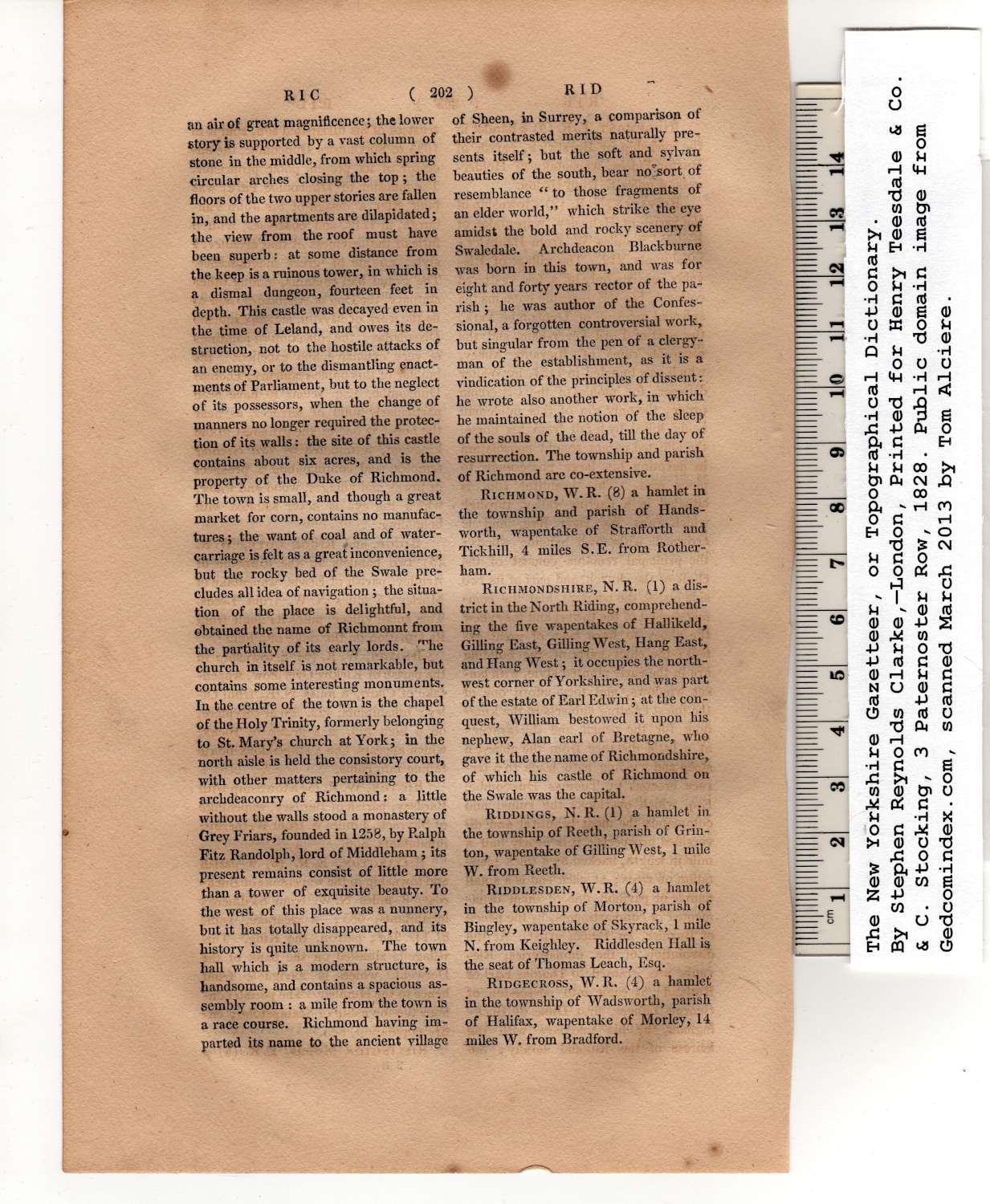|
an air of great magnificence; the lower
story is supported by a vast column of
stone in the middle, from which spring
circular arches closing the top; the
floors of the two upper stories are fallen
in, and the apartments are dilapidated;
the view from the roof must have
been superb: at some distance from
the keep is a ruinous tower, in which is
a dismal dungeon, fourteen feet in
depth. This castle was decayed even in
the time of Leland, and owes its de-
struction, not to the hostile attacks of
an enemy, or to the dismantling enact-
ments of Parliament, but to the neglect
of its possessors, when the change of
manners no longer required the protec-
tion of its walls: the site of this castle
contains about six acres, and is the
property of the Duke of Richmond.
The town is small, and though a great
market for corn, contains no manufac-
tures ; the want of coal and of water-
carriage is felt as a great inconvenience,
but the rocky bed of the Swale pre-
cludes all idea of navigation; the situa-
tion of the place is delightful, and
obtained the name of Richmaunt from
the partiality of its early lords. "Hie
church in itself is not remarkable, but
contains some interesting monuments.
In the centre of the town is the chapel
of the Holy Trinity, formerly belonging
to St. Mary’s church at York; in the
north aisle is held the consistory court,
with other matters pertaining to the
archdeaconry of Richmond; a little
without the walls stood a monastery of
Grey Friars, founded in 1258, by Ralph
Fitz Randolph, lord of Middleham ; its
present remains consist of little more
than a tower of exquisite beauty. To
the west of this place was a nunnery,
but it has totally disappeared, and its
history is quite unknown. The town
hall which jus a modern structure, is
handsome, and contains a spacious as-
sembly room : a mile from the town is
a race course. Richmond having im-
parted its name to the ancient village
of Sheen, in Surrey, a comparison of
their contrasted merits naturally pre-
sents itself; but the soft and sylvan
beauties of the south, bear no'sort of
resemblance “ to those fragments of
an elder world,” which strike the eye
amidst the bold and rocky scenery of
Swaledale. Archdeacon Blackburne
was born in this town, and was for
eight and forty years rector of the pa-
rish ; he was author of the Confes-
sional, a forgotten controversial work,
but singular from the pen of a clergy-
man of the establishment, as it is a
vindication of the principles of dissent:
he wrote also another work, in which
he maintained the notion of the sleep
of the souls of the dead, till the day of
resurrection. The township and parish
of Richmond are co-extensive. |
Richmond, W.R. (8) a hamlet in
the township and parish of Hands-
worth, wapentake of Strafforth and
Tickhill, 4 miles S.E. from Rother-
ham.
Richmondshire, N. R. (1) a dis-
trict in the North Riding, comprehend-
ing the five wapentakes of Hallikeld,
Gilling East, Gilling West, Hang East,
and Hang West; it occupies the north-
west corner of Yorkshire, and was part
of the estate of Earl Edwin; at the con-
quest, William bestowed it upon his
nephew, Alan earl of Bretagne, who
gave it the the name of Richmondshire,
of which his castle of Richmond on
the Swale was the capital.
Riddings, N. R. (1) a hamlet in
the township of Reeth, parish of Grin-
ton, wapentake of Gilling West, 1 mile
W. from Reeth.
Riddlesden, W.R. (4) a hamlet
in the township of Morton, parish of
Bingley, wapentake of Skyrack, 1 mile
N. from Keighley. Riddlesden Hall is
the seat of Thomas Leach, Esq.
Ridgecross, W.R. (4) a hamlet
in the township of Wadsworth, parish
of Halifax, wapentake of Morley, 14
miles W, from Bradford. |
